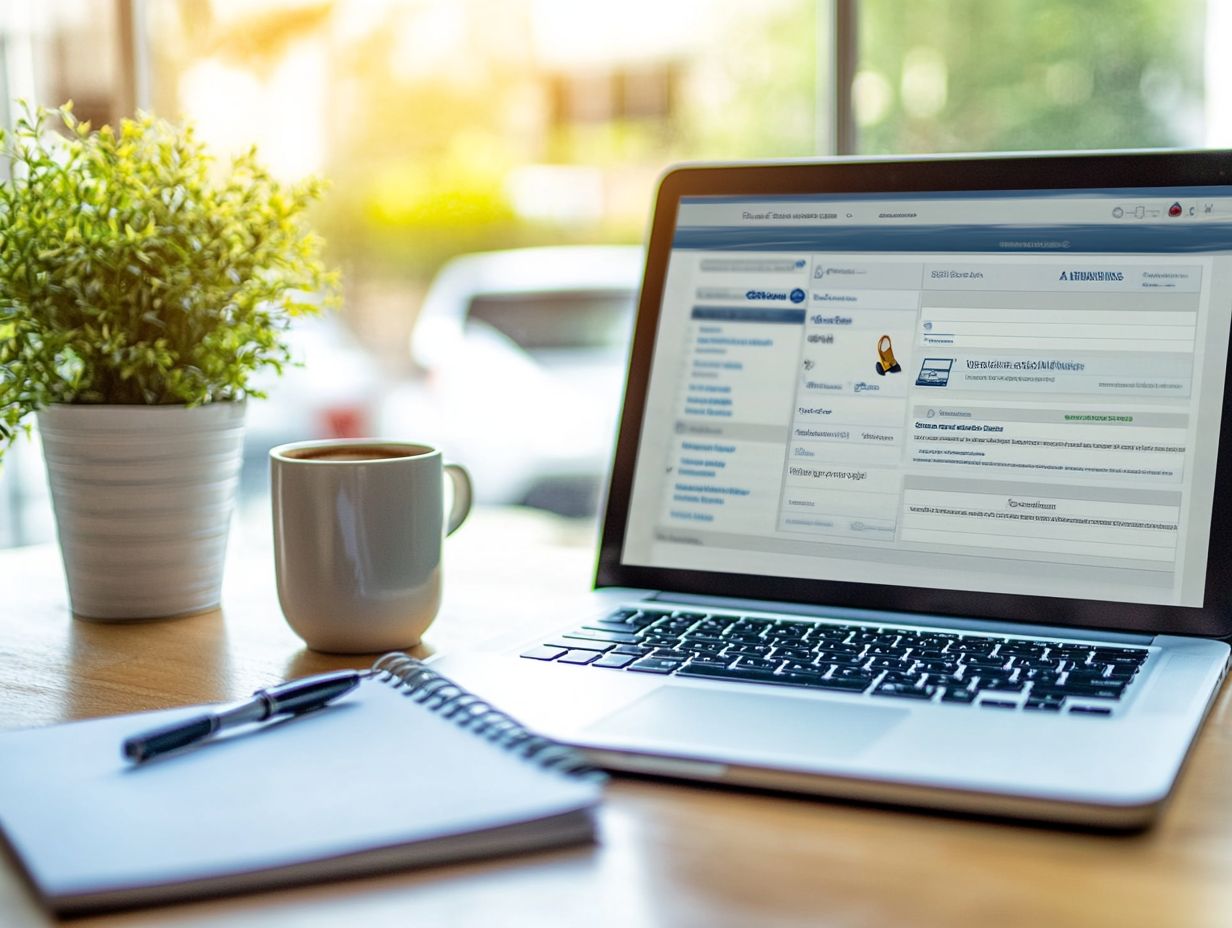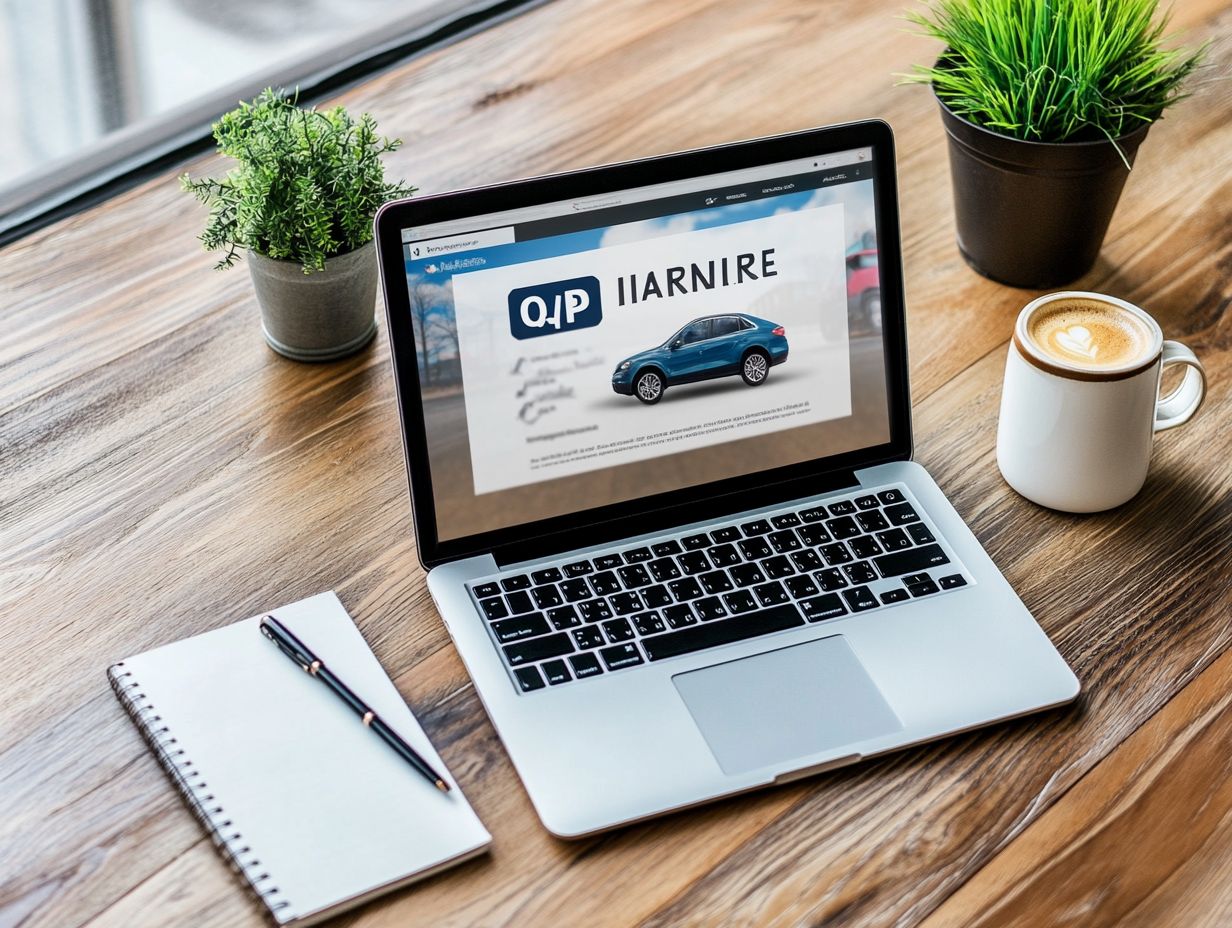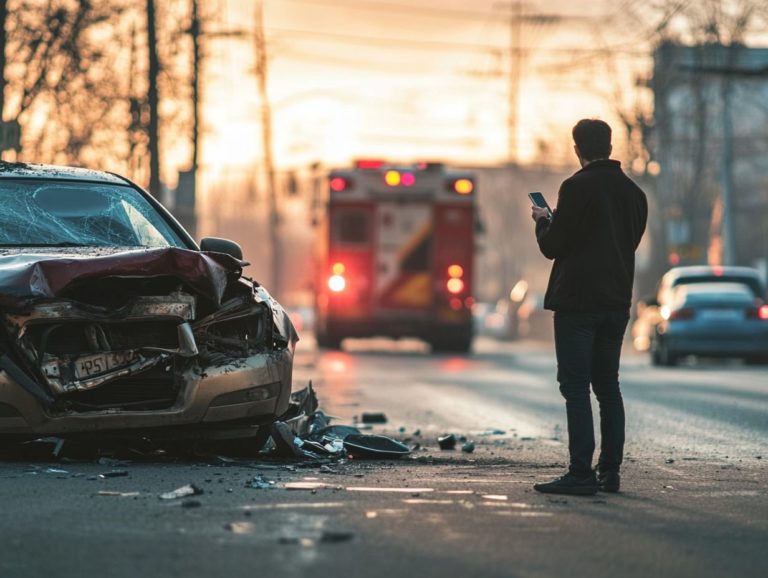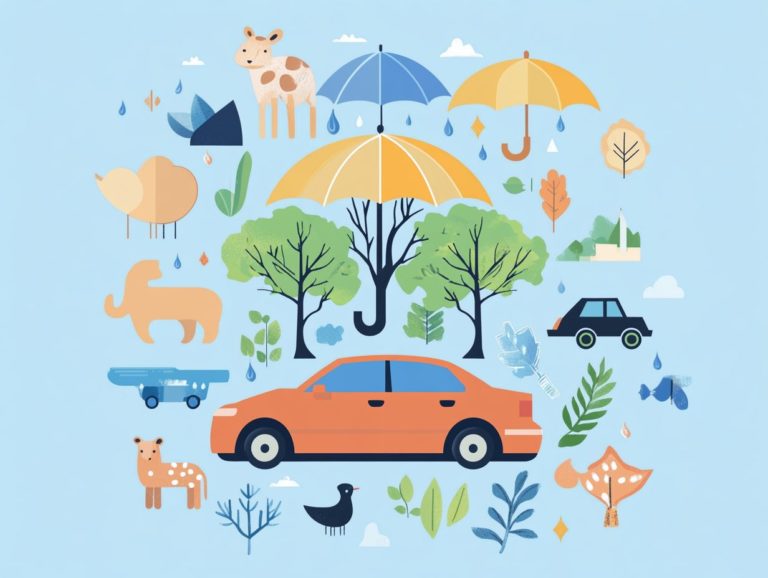What Are the Most Common FAQs About Auto Insurance?
Navigating the world of auto insurance can feel daunting, especially with so many options and terms to understand. Whether you’re entering the market for the first time or considering a change in providers, grasping the basics of auto insurance is essential.
This includes knowing its significance, how it operates, and the various coverage options available to you. Get ready to dive deep into the world of auto insurance!
This article will address common questions, clarify essential concepts, and provide practical advice to empower you to make informed decisions about your insurance needs.
Dive in to discover how to protect yourself on the road while keeping your budget intact.
Contents
- Key Takeaways:
- 1. What Is Auto Insurance and Why Is It Important?
- 2. How Does Auto Insurance Work?
- 3. What Types of Coverage Does Auto Insurance Offer?
- 4. What Factors Affect the Cost of Auto Insurance?
- 5. What Is the Difference Between Liability and Full Coverage?
- 6. How Much Auto Insurance Coverage Do I Need?
- 7. Can I Change My Auto Insurance Policy?
- 8. What Happens If I Get into an Accident without Insurance?
- 9. Are There Any Discounts Available for Auto Insurance?
- 10. What Should I Do After a Car Accident?
- 11. How Does Auto Insurance Handle Uninsured or Underinsured Motorists?
- 12. What Is the Difference Between Collision and Comprehensive Coverage?
- 13. How Can I Lower My Auto Insurance Premium?
- 14. Can I Use My Personal Auto Insurance for Business Purposes?
- 15. What Happens If I Cancel My Auto Insurance Policy?
- Frequently Asked Questions
- What Are the Most Common FAQs About Auto Insurance?
- What are the different types of auto insurance coverage?
- How much auto insurance coverage do I need?
- Do I need auto insurance if I don’t own a car?
- How can I lower my auto insurance premium?
- What should I do if I’m involved in a car accident?
- What happens if I let someone else drive my car?
Key Takeaways:

- Auto insurance is crucial for protecting yourself, your vehicle, and others on the road.
- Understanding how auto insurance works and what factors affect its cost can help you make informed decisions about coverage.
- Don t wait! Regularly update your auto insurance policy and follow the proper steps after a car accident.
1. What Is Auto Insurance and Why Is It Important?
Auto insurance acts as a vital financial safeguard, protecting you from unexpected expenses related to accidents, theft, and damage. By understanding its importance, you can make well-informed choices about your coverage needs and policy limits, ensuring your financial well-being and peace of mind while driving.
This type of insurance meets the legal requirements in most states, which mandate at least a minimum level of coverage. It also shields you from legal responsibilities that can arise from accidents, potentially leading to significant repair costs and medical expenses.
The financial consequences of driving without sufficient auto insurance can be severe. You may face hefty out-of-pocket costs, legal penalties, and even the loss of your driving privileges. Adequate coverage protects your personal property in case of theft or damage, alleviating the stress and burden of unexpected incidents on the road.
2. How Does Auto Insurance Work?
Auto insurance serves as your safety net, allowing you to make monthly payments to an insurance company for coverage that helps manage the costs associated with accidents and claims.
Navigating this landscape often means working with an insurance representative or a local independent agent, who can help you select the right level of coverage tailored to your needs and budget. Once your policy is set up, filing a claim is typically straightforward you can do it online or over the phone, initiating the investigation and determining payouts for damages.
The processing time for claims can vary, depending on the complexity of your case and the volume of claims the insurer is handling. Meanwhile, premium rates depend on several factors, directly impacting the range of coverage options available to you. Understanding these dynamics is crucial for making informed choices that align with your financial and personal needs.
3. What Types of Coverage Does Auto Insurance Offer?
Auto insurance offers a variety of coverage options to meet your diverse needs. You’ll find liability coverage for bodily injury and property damage, comprehensive coverage for non-collision incidents, and collision coverage for damages from accidents.
These coverage types work together to provide solid financial protection on the road. Liability coverage is essential; it helps you manage claims related to injuries and damage to others’ property in an accident you caused, like when you accidentally bump another car at an intersection.
Comprehensive coverage steps in during unforeseen events like theft, vandalism, or natural disasters. Picture a sudden hailstorm damaging your vehicle’s exterior. Collision coverage comes into play when your vehicle is damaged due to a collision, regardless of who is at fault, like hitting a guardrail.
Understanding how these coverages interact will enable you to navigate the complexities of auto insurance with confidence and ease.
Don’t hesitate! Review your current insurance, seek quotes, and empower yourself to make the best decisions for your coverage needs.
4. What Factors Affect the Cost of Auto Insurance?
Several factors influence the cost of your auto insurance. Your risk tolerance, state requirements, personal information, selected coverage limits, and available discounts all play a part in determining your insurance costs.
Among these, your driving history is particularly significant. A clean driving record often earns you lower quotes. However, a history filled with accidents or violations can cause your rates to skyrocket. The type of vehicle you insure also matters; luxury cars or those classified as high-risk typically come with higher premiums.
Your location also affects costs. Urban areas generally face steeper rates due to increased theft and accident statistics. It s crucial to grasp how these elements intertwine with your specific needs. This understanding makes it essential to compare premium rates and coverage options from multiple insurance companies, helping you find the most suitable policy for your situation.
5. What Is the Difference Between Liability and Full Coverage?
The primary difference between liability and full coverage auto insurance lies in the scope of protection. Liability coverage addresses only costs related to damages or injuries inflicted on others. In contrast, full coverage offers a broader safety net that protects both your vehicle and your finances.
Liability coverage is particularly advantageous for those who drive older cars or have limited money. It typically features lower premiums, ensuring you meet state minimum requirements without breaking the bank.
On the other hand, full coverage is ideal for drivers of newer vehicles. It encompasses collision and comprehensive coverage, which covers damages from accidents as well as non-collision events like theft or natural disasters.
When evaluating premium rates, consider your vehicle s value and your personal finances. Opting for full coverage may result in higher monthly payments, but it provides a valuable safety net should an unexpected incident occur.
6. How Much Auto Insurance Coverage Do I Need?

Determining the right amount of auto insurance coverage requires considering various factors, including your risk tolerance, financial situation, state requirements, and specific needs tied to your vehicle and driving habits.
It’s crucial to take a closer look at your circumstances, such as the current value of your vehicle and any personal assets that might be at stake. Evaluating potential costs from accidents, including medical bills and property damage, adds another important dimension to this assessment.
While understanding the legal minimums required by your state can provide a useful starting point, it often makes sense to exceed those limits. This is especially true if you frequently drive or navigate high-traffic areas.
All these elements come together to give you a clearer picture of the coverage levels that best support your personal safety and financial security.
7. Can I Change My Auto Insurance Policy?
Yes, you absolutely have the power to change your auto insurance policy! Whether you’re looking to adjust coverage limits, switch to a different insurance company, or fine-tune your portfolio to better match your current needs, it s all within your reach.
You might find yourself reassessing your policy for a variety of reasons. Maybe you ve just bought a new car, moved to a new location, or added a teen driver to your family. The first step is to research the options that best fit your evolving circumstances and evaluate the coverage levels you desire.
As you navigate this process, keep in mind how these changes could affect your premium rates. Some adjustments might lead to savings, while others could mean higher financial commitments.
By exploring different coverage options, you can ensure that you maintain the right level of protection tailored to your lifestyle, allowing you to drive with confidence and peace of mind. Don’t wait! Ensure your coverage meets your needs today!
8. What Happens If I Get into an Accident without Insurance?
Getting into an accident without insurance can lead to significant money problems. You might face liabilities for accident expenses, legal defense costs, and potential penalties from state authorities. All of these could jeopardize your financial health.
This situation can lead to high out-of-pocket costs. You might also face suspended licenses and higher insurance premiums later. The law tends to look unfavorably on uninsured drivers, which means you could face legal actions from affected parties seeking compensation.
If you find yourself in this tough spot, explore options like short-term insurance coverage or state assistance programs. These can help you get back on track. Consult legal professionals to clarify your rights after an accident and protect yourself from further complications.
9. Are There Any Discounts Available for Auto Insurance?
Many insurance companies offer a range of discounts that can significantly lower your premium costs. These may include Safe Driver discounts, multi-policy discounts, and tailored incentives that fit your unique needs.
These discounts reward responsible choices, such as maintaining a clean driving record, bundling different types of coverage, or completing specific safety courses.
Some providers may offer unique savings opportunities based on factors like your loyalty as a customer or membership in particular organizations. Understanding how to qualify for these discounts whether through online applications or conversations with agents can lead to substantial savings.
This not only impacts your overall insurance costs but also makes coverage more accessible for a diverse range of individuals.
10. What Should I Do After a Car Accident?
After a car accident, follow these steps to prioritize your safety and streamline the insurance claims process. This includes documenting the incident, assessing your accident-related expenses, and understanding your deductible options.
- First, gather all pertinent information. Collect details from the other party, their insurance information, and any witness accounts that could clarify what happened.
- Next, promptly contact the authorities. They will assist at the scene and generate an official report, which insurance companies often require.
- Navigating the insurance claims process can feel overwhelming. Contact your insurer as soon as possible to report the incident. They will guide you on the next steps and potential timelines for processing your claims.
11. How Does Auto Insurance Handle Uninsured or Underinsured Motorists?
Auto insurance policies generally include important provisions for uninsured or underinsured motorists. This coverage offers you and your passengers essential protection if an accident is caused by a driver without adequate insurance.
This aspect of auto insurance provides financial security for medical expenses, lost wages, and vehicle repair costs. It ensures you re protected even in the face of another s negligence. This coverage not only safeguards accident victims but also promotes responsible driving among all motorists.
To make the most of this coverage, first check whether these provisions are included in your policy. When an accident occurs, promptly file a claim. This typically involves documenting the incident details, gathering evidence, and reaching out to your insurance provider to start the claims process. Doing so will help you secure timely and efficient support during what can often be a stressful time.
12. What Is the Difference Between Collision and Comprehensive Coverage?

Collision and comprehensive coverage are two distinct pillars of auto insurance. Collision coverage pays for damage from accidents. Comprehensive coverage handles theft, natural disasters, and other non-collision incidents.
Understanding the nuances between these types of coverage is essential for anyone wanting to make informed decisions about their auto insurance policy. Collision coverage kicks in when you find yourself in a crash with another vehicle or object. In contrast, comprehensive coverage applies in situations such as vandalism, fire damage, or encounters with wildlife.
Drivers have a range of deductible options available. A deductible is the amount you pay out of pocket before your insurance kicks in. Choosing a higher deductible often results in lower premium costs but can lead to larger expenses in the event of an accident or loss.
Understanding these details enables you to tailor your insurance choices to meet your unique needs and circumstances.
13. How Can I Lower My Auto Insurance Premium?
Are you thinking about cutting costs on your auto insurance? Here are some easy strategies to help you save! You can employ several effective methods to lower your auto insurance premium, such as maintaining safe driving habits, capitalizing on available discounts, and selecting the right deductible options.
By consistently demonstrating safe driving behaviors, you can build a positive driving record. This often qualifies you for substantial discounts from providers. You can also bundle multiple insurance policies like home and auto to reduce overall costs.
It’s wise to regularly review your coverage with an independent agent. They can offer valuable insights into potential savings or necessary adjustments, ensuring you’re not paying for coverage that no longer suits your current circumstances.
14. Can I Use My Personal Auto Insurance for Business Purposes?
Using personal auto insurance for business purposes can lead to coverage gaps. Most personal policies lack the adequate liability coverage needed for commercial activities, which could jeopardize both your business and personal financial well-being.
If you have an accident while engaged in business-related tasks, you may expose yourself to significant legal and financial repercussions. Therefore, consider the necessity of commercial auto insurance, specifically designed to provide protection tailored to business driving. Familiarizing yourself with the various types of coverage available such as liability, comprehensive, and collision is crucial for accurately assessing your needs.
As a business owner, evaluate your driving patterns, including how often and how far you travel. This will help you determine which coverage levels are appropriate for your unique circumstances.
15. What Happens If I Cancel My Auto Insurance Policy?
Canceling your auto insurance policy can lead to a range of consequences you ll want to consider. You might face potential lapses in coverage, shifts in premium pricing, and implications for future coverage limits with your insurance provider.
When you decide to cancel your auto insurance, timing and method are crucial to avoid unnecessary fees or penalties. Many companies impose cancellation fees that can vary widely. Leaving a gap in coverage could result in higher premiums when seeking new insurance later on. A history of frequent cancellations could negatively impact your risk profile, making it tougher to find affordable rates in the future.
It s often smart to conduct thorough research or consult with a professional before making such a significant decision.
Frequently Asked Questions
What Are the Most Common FAQs About Auto Insurance?
Auto insurance is a crucial aspect of car ownership, but it can also be a confusing topic. To clear up some misconceptions, here are some of the myths about auto insurance and the most frequently asked questions about it:
Don t miss out on potential savings! Simple steps like improving your driving record can lead to big discounts!
What are the different types of auto insurance coverage?

Auto insurance comes in several forms. These include liability, collision, comprehensive, personal injury protection, and uninsured/underinsured motorist coverage.
Each type protects you financially in the event of accidents, injuries, or damage to your vehicle.
How much auto insurance coverage do I need?
Your required auto insurance coverage varies based on your state’s minimum requirements and the value of your vehicle. Consider obtaining enough coverage to safeguard your assets in case of a lawsuit after an accident.
Do I need auto insurance if I don’t own a car?
You still need auto insurance even without a car. Insurance for those who don’t own a car provides liability coverage when borrowing or renting a vehicle.
To lower your auto insurance premium, consider bundling policies or maintaining a good driving record. Also, take advantage of discounts and choose a higher deductible.
Regularly reviewing your coverage ensures you aren’t paying for unnecessary add-ons.
What should I do if I’m involved in a car accident?
If you’re in a car accident, stay at the scene and call the police. After exchanging insurance information with the other driver, take photos of the damage.
Report the accident to your insurance company right away to start the claims process.
What happens if I let someone else drive my car?
Your auto insurance will cover someone else driving your car, provided they don’t have their own insurance. However, if they cause an accident, it will affect your record and could raise your insurance rates.






